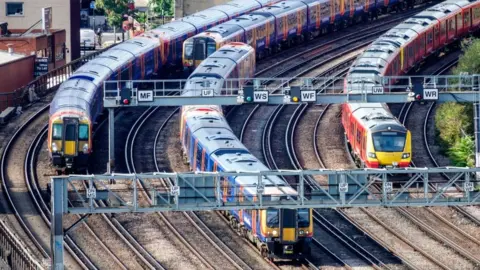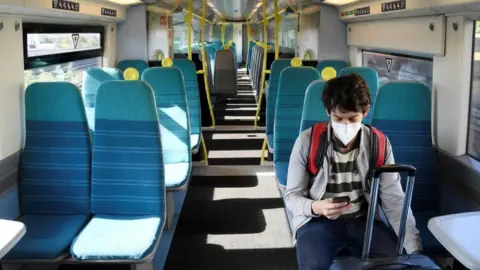Government to cut £1bn from rail budget
 Getty Images
Getty ImagesThe government has cut £1bn from the rail infrastructure budget following the chancellor's Spending Review.
Rishi Sunak had previously promised record infrastructure investment as part of the government's "levelling up" agenda.
Until now, Network Rail's "enhancement" budget for the five year period from 2019-24 had been set at £10.4bn.
But, this week rail minister Chris Heaton-Harris said that the budget would now be £9.4bn.
That has put a question mark over some long-planned improvements to rail infrastructure.
The BBC has contacted the government for comment.
Claw back concerns
The cuts were not mentioned in Spending Review documentation, which stressed record investment in strategic road and rail projects.
The shortfall is likely to leave some projects without funding.
And the rail industry has raised concerns that the budget could be cut by as much as 10% overall if the government tries to claw back some funding that it was unable to spend this year, partly because of the pandemic.
Darren Caplan, the chief executive of the Railway Industry Association, called the £1bn cut in funding "very disappointing".
"Rail enhancements are essential in ensuring our rail network is fit for the future, improving reliability, connectivity, customer experience and helping to reduce carbon emissions," he said.
"Taking our foot off the pedal now on rail investment will not help for when passengers return following the coronavirus pandemic."
Meanwhile, the government is believed to have told the industry to concentrate on so-called "Northern Powerhouse" rail and reversing the Beeching cuts, which closed thousands of miles of railway in the sixties. Both plans featured in Boris Johnson's manifesto.
Since the start of the pandemic, the government has spent billions subsidising the rail network, so that trains were able to continue running during lockdown, even as commuters stayed at home.
 Reuters
ReutersSo far, the bill has run to more than £3.5bn and the Department for Transport has said "significant" support will still be needed.
In March, the government brought the Northern franchise under state control. Meanwhile, the Welsh government has announced plans to nationalise Transport for Wales' rail services.
Ministers confirmed in October that they would take over the franchise from KeolisAmey, with day-to-day services set to be run by a publicly-owned company.
Although passenger numbers have edged up since lockdown, they are still less than half their pre-pandemic levels.
As a result, emergency measures to cover the losses of train firms have been extended by 18 months. They reduce the fees that can be earned by the companies but will mean that trains are still able to run, even with fewer passengers.
The day-to-day operating budget of the state owned rail operator covering repairs, renewals and the operations of stations was unaffected.
News of the budget cuts comes as the future of the franchise system, under which the railways have been run since privatisation, looks set to be replaced by a system of concessions, tightening the grip of government over the industry.
